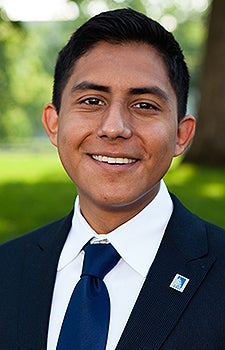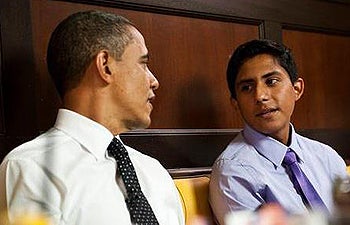Oscar De Los Santos Selected as Truman Scholar
Oscar De Los Santos recalled lunching with President Barack Obama at a café near the White House. Both ordered hamburgers and french fries, Santos going with a strawberry milkshake while the president enjoyed a chocolate shake.
Santos, a junior political science major, an incoming freshman at the time, had worked on Obama’s presidential campaign. He and five others had won an essay contest about effective leadership. Part of their award was lunch with the president in Washington, D.C.
“President Obama was friendly and easy to talk to,” said De Los Santos in a Skype interview from Madrid, Spain, where he is studying abroad for the Spring semester. “He’s extremely humble and down-to-earth.”
They talked about family, but also issues, such as the one De Los Santos is most passionate about: voting rights for all. His work toward voter protection helped to earn him a Harry S. Truman Scholarship. The federal scholarship provides up to $30,000 to students pursuing graduate degrees leading to careers in public service.
De Los Santos is among 59 exceptional college students from 52 colleges and universities nationwide selected as 2014 Truman Scholars. The new Truman Scholars, mostly juniors, were selected from among 655 candidates nominated by 294 colleges and universities. They were chosen by 17 independent selection panels based on their academic success and leadership accomplishments, and their likelihood of becoming public service leaders.
De Los Santos is from North Hollywood, Calif., and represents California. He is USC’s 18th Truman Scholar. USC’s Office of Academic and International Fellowships actively supports nationally competitive scholarships such as the Truman program. The office strives to support USC nominees through every major step, said Noosha Malek, director of the fellowships office.

Oscar De Los Santos is from North Hollywood, Calif., and represents California. He is USC’s 18th Truman Scholar. Photo courtesy of the Congressional Hispanic Caucus Institute.
“We believe Oscar has all of the qualities to be a successful agent of change,” Malek said. “He has demonstrated an innate drive for community betterment and empathy for underserved communities. He has a genuine passion for social change, and the natural leadership ability to mobilize others for action. We are incredibly proud of his accomplishments.”
In 2015, De Los Santos will work at Truman’s Washington Summer Institute, addressing the issue of voter protection. In 2011, Florida passed a bill that shortened the early voting period and imposed onerous requirements on those seeking to register, De Los Santos said.
“Seeing firsthand the law’s disproportionately injurious effects on low-income and minority voters while working in the state during the 2012 election aroused my passion for voter protection,” said De Los Santos, a Norman Topping scholar.
In the aftermath of the Supreme Court’s 2013 decision to strike down a section of the Voting Rights Act, Texas, North Carolina and Virginia enacted legislation aimed at restricting voting access for partisan purposes, he continued.
“I hope to use my time with the institute to work with the Brennan Center for Justice, which successfully filed suit against the Florida election reform law in League of Women Voters of Florida v. Browning. The suit blocked the law’s most restrictive elements, in order to help undo the actions of Virginia and other states.”
De Los Santos is the son of immigrants from Jalisco, Mexico, who wanted to provide their children with educational opportunities not afforded to them.
“My parents came to the U.S. from Mexico illegally out of desperation, risking their lives to break the crushing cycle of intergenerational poverty that plagued their pueblo,” De Los Santos said. “And in coming here they did break it.”
His father found work in the factories of the Los Angeles aerospace industry and his mother became a homemaker, raising five kids.
“They were able to put us all through college, thus ensuring the cycle would remain broken for their kids,” De Los Santos said. “Yet, compared to most other Latinos, we are an exception to the rule. The Census Bureau found, Latino children today are likelier to live in prison cells than in college dorm rooms. There is an ugly divide between the rhetoric of social mobility and the reality of poverty that some Latinos experience in this country.”

After winning an essay contest on effective leadership, Oscar De Los Santos receives a lunch invitation from President Barack Obama. They lunched near the White House. Photo courtesy of Oscar De Los Santos.
De Los Santos is considering entering law school. He knows he wants to protect social mobility for all minorities, and noted that according to the California Department of Finance, in 2014, California’s population of 14 million Latinos is expected to surpass the size of the non-Hispanic white population.
“The fate of our state is inextricably and increasingly bound to the fate of the Latino community,” he said.
De Los Santos said that currently, a Latino leadership crisis exists in public service. Nationwide, Latinos comprise three percent of state legislators. In California, there are no Latino statewide elected officials, according to a tally of statewide officials from the California Chamber of Commerce, and no Latinos serving in the State Supreme Court.
“I want to change this,” he said. “I want to become a voice in government that advocates on our behalf. After gaining experience in our courts and communities, I would like to represent my home district in the California State Assembly.”
Generally, assembly members sit on five standing committees.
Should he serve, he would seek to sit on the education, elections and redistricting, higher education, health and public safety committees.
“These areas in particular are ones in which Latinos face serious barriers to social mobility,” he said, “challenges that I believe could be remedied in part by legislation that I would be in a position to propose.”